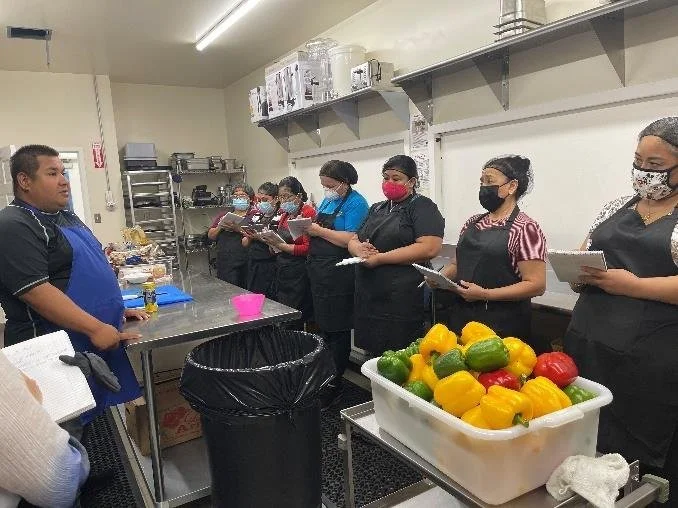Moving the Needle in the Fight Against Food Insecurity
By Anna Hargrave
In 2019, a study by the USDA estimated 1 in 8 Americans were “food insecure”. In Montgomery County, one of the wealthiest counties in the country, that number was closer to 1 in 12 (about 8%).
Within six month, both of those numbers nearly doubled, as thousands of families found themselves struggling with the social and economic impacts of the COVID-19 pandemic.
In response, donors across Montgomery County sprang into action, pouring their time and resources into Food for Montgomery – a strategic public-private response effort spearheaded by The Community Foundation, County Government, and the Montgomery County Food Council to address urgent needs within our food security system.
To date, Food for Montgomery has deployed over $2.6 million to support nonprofits in our food system. This work is increasingly vital – as studies suggest that food insecurity may have more to do with an already broken food system than the impact of a global pandemic.
Even as COVID infection rates continue to decline, food insecurity rates remain high -- the latest report by the Capital Area Food Bank says that 46% of households with children in Montgomery County have experienced food insecurity at some point in 2022.
As we continue work with our amazing nonprofit grantees to lower these rates and build a more just and equitable food system, here are three key lessons that we have learned:
Go for the “Triple Win”
The pandemic forced nonprofits and government to collaborate more strategically and efficiently to meet ever-changing needs. In time, many found ways to innovate a single creative solution/partnership to solve multiple problems facing the community. By seeking a “triple win” they were able to leverage both philanthropic and public dollars to make a deeper impact.
For example, the leaders of the Mid-County Hub, led by Hughes United Methodist Church, realized they needed to provide hot meals for frail seniors, people with disabilities, and other vulnerable residents facing food insecurity. Food for Montgomery’s grant enabled Mid-County Hub to team up with So What Else which provided donated and recovered food. They then partnered with IMPACT Silver Spring, which led a culinary class to teach residents new skills while they prepared the weekly meals for their neighbors. Ultimately, this effort rescued perfectly good food that might have ended up in a landfill, turned it into delicious meals, and empowered people with meaningful skills that helped them get jobs in local restaurants.
Community Members take notes during a Culinary Class offered by IMPACT Silver Spring
To make a deep impact, racial equity must be top of mind (not an afterthought)
The tragedy of food insecurity is inevitably tied to racial inequity. According to the USDA and Feeding America, nearly 1 in 5 Black people and 1 in 6 Latinx people live in households facing food insecurity due to a wide range of social, economic, and environmental challenges. That’s 2-3 times higher than the rate of food insecurity experienced by white individuals.
In order to create lasting, meaningful change in our food system, we need to lead with racial equity at the forefront. This means not just serving people with dignity, but also creating space so that low-income residents can lead the change they want to see for their communities.
For example:
Early on, leaders at the Manna Food Center realized that many families – especially in immigrant communities -- were fearful of asking for help from unfamiliar organizations. In addition, given the incredible diversity of our community, it was difficult to provide all the culturally specific foods that our many immigrant communities need to prepare traditional meals at home.
Community Member poses with produce grown at an AfriThrive Community Garden. AfriThrive partnered with the local immigrant community to grow culturally appropriate produce for residents.
To address both issues, Manna teamed up with several grassroots nonprofits that employed resident leaders who already had established relationships within their communities. Thanks to this partnership, those neighborhood leaders were able to enroll more than 4,000 households to receive food through Manna and provide 1,500 households with vouchers to purchase supplemental food from ethnic grocery stores.
Systems either amplify or undermine your philanthropy—there is no in between!
Policy decisions at the federal, state, and local levels have a major impact on what we all eat—and how much it costs us. Those decisions can also undermine our philanthropy by making it harder and costlier for nonprofits to help people. That is why it is vital we invest in strategic partners advocating for a healthier, more equitable food system.
One fantastic example is the Montgomery County Food Council which created a food security response plan in partnership with over 100 nonprofits, local businesses, and government partners. Working closely with Montgomery County Government and The Community Foundation, the Food Council’s leadership was vital to maximizing public and private resources to meet community needs. Building on that important work, the Food Council is now galvanizing partners and gathering insights from families who are experiencing food insecurity right now. Together, they are identifying barriers and developing strategies to reduce food insecurity across all childhood age groups in Montgomery County.
As we continue our efforts to fight hunger and build a more just and equitable food system, we would like to thank our donors and partners for their consistent and ongoing support. Creating meaningful, lasting systems change requires an incredible amount of time, resources, and patience. We have witnessed all of this, and more from our incredibly generous community.
With your support, we continue to move this work forward and build a Montgomery County where food is plentiful for all.
For more information about Food for Montgomery and it’s incredible impact, visit https://www.thecommunityfoundation.org/food-for-montgomery-fund



